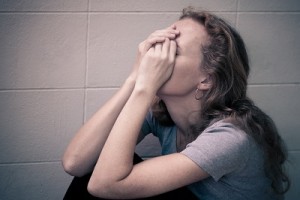- Calls to this hotline are currently being directed to Within Health, Fay or Eating Disorder Solutions
- Representatives are standing by 24/7 to help answer your questions
- All calls are confidential and HIPAA compliant
- There is no obligation or cost to call
- Eating Disorder Hope does not receive any commissions or fees dependent upon which provider you select
- Additional treatment providers are located on our directory or samhsa.gov
Toxic Shame & Eating Disorders

When Shame Becomes Toxic
Shame “occurs in the context of self-reflection or self-perception and involves a fear or expectation of eliciting disgust in others [1].” As such, experiencing shame, in general, does not feel great. It becomes a new beast entirely when those feelings of shame reach a level considered to be toxic.
Toxic shame involves experiencing shame for a longer duration and on a more intense and emotionally and psychologically internalized level [2]. No outside event is needed to bring about toxic shame, as thoughts within the mind are enough to trigger them.
Toxic shame is often so overwhelming and uncomfortable that individuals who experience it also experience “shame anxiety” – a constant fear of feelings of shame [2].
Toxic shame often comes about as general shame does, from experiences and societal messages one has engaged with since childhood. One may not even be able to remember the specific chronic or events of shame that triggered the toxicity [2].
Individuals that are heavily impacted by toxic shame are found to craft a “shame narrative” about themselves [2]. Repeating this narrative until they begin to believe it and look at everything that happens to them and around them through a lens of their own inadequacies and shortcomings.
It likely doesn’t need to be sad that this toxic shame becomes deeply embedded in the psyche and identity of the individual. This can make an individual particularly vulnerable to disordered eating thoughts, beliefs, and behaviors.
Shame and Eating Disorders
There is a great deal of research on shame and eating disorders, and, spoiler alert, these two have a very close relationship with a lot in common.
These studies have not only shown us that shame and eating disorders are associated with one another but that there are nuances to this, depending on the type of shame and the eating disorder diagnosis.
Shame is often split into two categories – internalized and externalized.
Internal shame involves “how one sees or judges the self,” and external shame is described as “how one perceives that others see the self.”
Both types of shame have predicted eating disorder behaviors. However, externalized shame is uniquely predictive of anorexia nervosa, whereas internalized shame seems to be predictive of bulimia nervosa [1].
Researchers further examined a concept known as bodily shame, shame related to one’s own or other’s perceptions of the body, and found that it is a stronger predictor of eating pathology than general shame [1].
 To make matters more confusing, bodily shame is also categorized into two types – current and anticipated.
To make matters more confusing, bodily shame is also categorized into two types – current and anticipated.
Current bodily shame is experienced in relation to one’s current body size,” and anticipated bodily shame describes shame “that is anticipated if one were to gain weight [1].”
To summarize, we have General Shame, which can be Internalized or Externalized, and we have Bodily shame, which can be Current Bodily Shame or Anticipated Bodily Shame. Both of these can also be Internalized or Externalized.
Shame has also been shown to worsen the severity of disordered eating, with one study indicating that “following periods of increased shame, a person’s eating pathology was more severe than usual [3].
The depth to which researchers have gone in examining shame should be an indicator of how important understanding is to eating disorder pathology.
Now, considering that toxic shame is internalized and embedded into the identity of an individual on a much more intense level than general shame, it serves to assume that toxic shame is also related to eating disorders.
Little research has been done on the topic. However, enough has been done to show they are associated with one another.
Healing Toxic Shame
A great deal of inner work must be done to work through toxic shame, as it is a belief system many have based their lives on for years.
One study specified that “time-dependent increases in self-compassion may interrupt” the relationship between toxic shame and eating disorder pathology [3].
Self-compassion acts as a form of self-directed care and can be a huge lesson to learn to heal not only feelings and beliefs related to shame but, disordered thoughts and beliefs related to the self and the body [3].
Resources
[1] Troop, N. A., Redshaw, C. (2012). General shame and bodily shame in eating disorders: a 2.5-year longitudinal study. European Eating Disorders Review, 20:5. [2] Lancer, D. (2019). What is toxic shame? PsychCentral. Retrieved from https://psychcentral.com/lib/what-is-toxic-shame/. [3] Kelly, A. C., Tasca, G. A. (2016). Within-persons predictors of change during eating disorders treatment: an examination of self-compassion, self-criticism, shame, and eating disorder symptoms.About the Author:
 Margot Rittenhouse, MS, PLPC, NCC is a therapist who is passionate about providing mental health support to all in need and has worked with clients with substance abuse issues, eating disorders, domestic violence victims, and offenders, and severely mentally ill youth.
Margot Rittenhouse, MS, PLPC, NCC is a therapist who is passionate about providing mental health support to all in need and has worked with clients with substance abuse issues, eating disorders, domestic violence victims, and offenders, and severely mentally ill youth.
As a freelance writer for Eating Disorder Hope and Addiction Hope and a mentor with MentorConnect, Margot is a passionate eating disorder advocate, committed to de-stigmatizing these illnesses while showing support for those struggling through mentoring, writing, and volunteering. Margot has a Master’s of Science in Clinical Mental Health Counseling from Johns Hopkins University.
The opinions and views of our guest contributors are shared to provide a broad perspective on eating disorders. These are not necessarily the views of Eating Disorder Hope, but an effort to offer a discussion of various issues by different concerned individuals.
We at Eating Disorder Hope understand that eating disorders result from a combination of environmental and genetic factors. If you or a loved one are suffering from an eating disorder, please know that there is hope for you, and seek immediate professional help.
Published June 9, 2020, on EatingDisorderHope.com
Reviewed & Approved on June 9, 2020, by Jacquelyn Ekern MS, LPC

The EatingDisorderHope.com editorial team comprises experienced writers, editors, and medical reviewers specializing in eating disorders, treatment, and mental and behavioral health.

